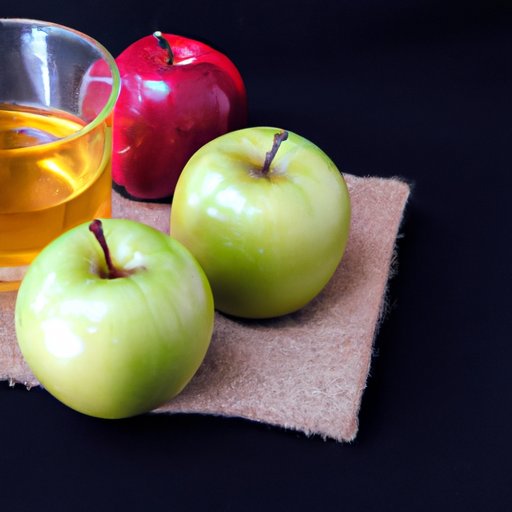
I. Introduction
Apple juice is a popular beverage enjoyed all around the world. It’s known for its deliciously sweet taste, but did you know it also has several potential health benefits? While it may be tempting to drink apple juice all day, it’s important to know the potential risks to your health as well. In this article, we’re going to explore the potential benefits and risks of drinking apple juice. This article is designed for anyone who wants to learn more about apple juice and its effects on health.
II. The Benefits of Drinking Apple Juice: How It Can Improve Your Health
Drinking apple juice regularly can have several potential benefits for your health. The antioxidants found in apple juice can help reduce inflammation, while also improving heart health and boosting immune function. Drinking apple juice in moderation may also lead to a decreased risk of developing certain types of cancer and neurological diseases. Some research suggests that drinking apple juice regularly may even help with weight loss.
Studies have shown that the pectin in apples can help to lower cholesterol levels, making apple juice an excellent choice for those with high cholesterol. The polyphenols in apples may also help to reduce the risk of cardiovascular disease. Keep in mind, however, that apple juice is typically high in sugar and calories, so moderation is key. To get the most out of apple juice’s potential health benefits, aim for organic or low-sugar options.
III. The Risks and Side Effects of Drinking Apple Juice: What You Need to Know
While apple juice may have some potential health benefits, there are also some risks and downsides to keep in mind. Apple juice is typically high in sugar, which can spike your blood glucose levels. Consuming too much sugar can also lead to dental decay and contribute to obesity. Additionally, apple juice may cause digestive issues in some individuals due to its high levels of fructose, which can trigger IBS symptoms in some people.
Some studies have also found that conventionally grown apples contain traces of pesticides and other chemicals. While these levels are generally considered safe, it can be a concern for those who are particularly sensitive. To minimize the potential risks of drinking apple juice, opt for organic options that are free from synthetic pesticides and other harmful chemicals.
IV. Why Organic Apple Juice is the Best Choice for Your Health
When it comes to apple juice, choosing organic is the way to go. Organic apple juice is free from synthetic pesticides and other harmful chemicals that can be found in conventionally grown apples. Additionally, opting for organic apple juice may help support environmentally sustainable farming practices and help promote the well-being of farmworkers.
While organic apple juice may be more expensive than its conventional counterpart, its potential health and environmental benefits make it worth the investment. To ensure that you’re getting pure, organic apple juice, look for products that are certified organic by reputable organizations like the USDA or Canada Organic.
V. Apple Juice vs Whole Apples: Which is Better for Your Health?
Eating whole apples is an excellent way to get the nutritional benefits of apples while also benefiting from the fiber content. While apple juice can provide some of the same nutritional benefits, it lacks the fiber found in whole apples. Additionally, whole apple consumption has been linked to a lower risk of chronic conditions such as type 2 diabetes and cardiovascular disease.
That being said, drinking apple juice, in moderation, can be a healthy addition to your diet. It’s an easy way to get all the beneficial nutrients in apples, such as vitamin C and potassium, without having to eat several whole apples. To get all the potential health benefits, consider incorporating both whole apple and apple juice consumption into your diet.
VI. Creative Ways to Use Apple Juice in Your Cooking and Baking
Apple juice can be a versatile ingredient in cooking and baking. It can be used as a natural sweetener in a variety of recipes, and its sweet apple flavor can add depth to savory dishes like marinades. Apple juice can also be used in baking recipes in place of other liquids, such as water or milk. It’s a great way to add a subtle natural apple flavor to your favorite recipes.
Here’s one recipe using apple juice as a marinade:
Apple-juice marinated pork chops:
– 4 boneless pork chops
– 1/2 cup apple juice
– 1/4 cup balsamic vinegar
– 2 teaspoons honey
– 1 tablespoon olive oil
– 1/2 teaspoon salt
– 1/4 teaspoon black pepper
Mix all ingredients together and pour over the pork chops. Allow to marinate for at least 30 minutes. Preheat grill or grill pan over medium-high heat. Grill pork chops for 4-5 minutes on each side, or until the internal temperature reaches 145°F.
VII. Conclusion
Apple juice can be a tasty and beneficial addition to your daily diet if consumed in moderation. While it has several health benefits, such as reducing inflammation and improving heart health, it is also high in sugar and should be consumed in moderation. Choosing organic apple juice is the best way to ensure you’re getting beneficial nutrients without harmful pesticides. Eating whole apples is also an excellent way to get all the potential benefits of an apple’s nutrients, fiber, and antioxidants. By incorporating apple juice and whole apples into your diet, you can enjoy a well-rounded approach to health and nutrition.




